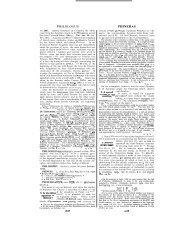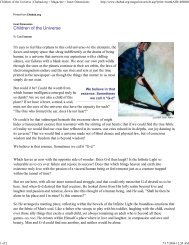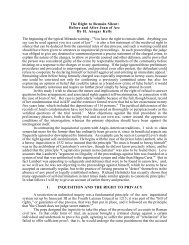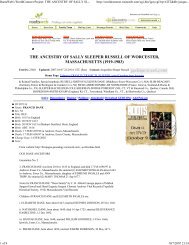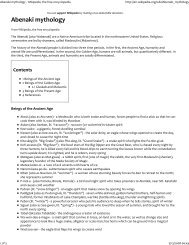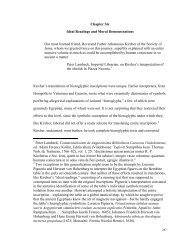sefi;g:v. - A Kabbalist walks into a bar, and the
sefi;g:v. - A Kabbalist walks into a bar, and the
sefi;g:v. - A Kabbalist walks into a bar, and the
Create successful ePaper yourself
Turn your PDF publications into a flip-book with our unique Google optimized e-Paper software.
SELEUCIDB SELEUCIDA<br />
an emblem of divine strength, probably also bearing<br />
allusion to <strong>the</strong> story told by Xppia; (Syr. 57) ; as an<br />
adjunct symbol in <strong>the</strong> field occurs an anchor, <strong>the</strong> badge<br />
of <strong>the</strong> family (cp Justin, 154).<br />
When Ptolemy Cass<strong>and</strong>er <strong>and</strong> Lysimachus again<br />
combined against Antigonus, Seleucus also joined <strong>the</strong><br />
coalition, <strong>and</strong> was largely instrumental in winning <strong>the</strong><br />
decisive victory at Ipsus in which Antigonus fell (301<br />
B. c. ). Seleucus consequently received a great extension<br />
of territory-all Syria, <strong>and</strong> Asia Minor as far as Phrygia<br />
(with <strong>the</strong> exception also of Cilicia). Hence <strong>the</strong><br />
Seleucidae are spoken of as kings of Asia (e.g., I Macc.<br />
86 ; though in o<strong>the</strong>r passages, such as I Macc. 11 13,<br />
it is doubtful whe<strong>the</strong>r <strong>the</strong> term Asia should be restricted<br />
to Asia Minor).<br />
Seleucus reigned over <strong>the</strong> largest kingdom that had<br />
been carved out of Alex<strong>and</strong>er's empire. The direct<br />
government of <strong>the</strong> provinces beyond <strong>the</strong> Euphrates was<br />
in <strong>the</strong> h<strong>and</strong>s of his son Antiochus. In 281 B. c., by <strong>the</strong><br />
defeat of king Lysimachus at Korupedion in Phrygia,<br />
Seleucus became heir by gage of battle to <strong>the</strong> crowns of<br />
Thrace <strong>and</strong> Macedonia, <strong>and</strong> appears to have intended<br />
to h<strong>and</strong> over his Asiatic possessions to his son, <strong>and</strong><br />
spend <strong>the</strong> remainder of his life (he was now about<br />
seventy-two years old) as ruler of his native country,<br />
Macedonia, from which he had been so long absent.<br />
He set out for Europe, but was murdered at Lysiniachia<br />
by Ptolemy Ceraunus, <strong>the</strong> exiled elder son of Ptolemy I.<br />
Ceraunus took possession of Thrace <strong>and</strong> Macedonia ;<br />
Antiochus succeeded to his fa<strong>the</strong>r's Asiatic sovereignty.<br />
Seleucus was undoubtedly an able administrator of what his<br />
Laodice, who immediately poisoned him <strong>and</strong> murdered<br />
Berenice <strong>and</strong> her infant son, <strong>and</strong> her own son ascended<br />
<strong>the</strong> vacant throne. It has, however, been suggested<br />
that this dark history was an invention of <strong>the</strong> Egyptian<br />
partizans of Berenice, <strong>and</strong> that Antiochus really died a<br />
natural death. According to <strong>the</strong> traditional interpreta-<br />
tion, Dan. 116 refers to this king (Jerome, in Zoc.) ; but<br />
<strong>the</strong> text is corrupt (see DANIEL, 5 6J).<br />
Seleucus II., Callinicus' (246-226 B.C.), was <strong>the</strong><br />
eldest son of <strong>the</strong> preceding by his first wife, Laodice.<br />
6. Seleucus 11.<br />
(246-226 B.C.).<br />
FFom <strong>the</strong>- moment of his accession<br />
Seleucus 11. was engaged in warfare<br />
with Ptolemy 111. Euergetes, who in-<br />
vaded Syria to avenge <strong>the</strong> death of his sister Berenice<br />
(<strong>the</strong> third Syrian War). This war is as mysterious in<br />
its course <strong>and</strong> results as <strong>the</strong> two previous conflicts<br />
between Egypt <strong>and</strong> Syria. Ptolemy, we learn, drove<br />
Seleucus beyond <strong>the</strong> Taurus, captured Antioch, made<br />
himself master of Syria <strong>and</strong> Phcenicia, <strong>and</strong> penetrated<br />
even beyond <strong>the</strong> Euphrates ; <strong>the</strong> Egyptian successes are<br />
sketched in even more extravagant terms, which make<br />
<strong>the</strong>m tantamount to <strong>the</strong> recovery of all Alex<strong>and</strong>er's<br />
empire.* Seleucus summoned to his aid his younger<br />
bro<strong>the</strong>r Antiochus Hieras, promising him <strong>the</strong> regency of<br />
Asia Minor. Ptolemy was indeed obliged to consent to<br />
a peace ; but Seleucus soon found himself at war with<br />
his own bro<strong>the</strong>r (Justin, 272). Antiochus was at first<br />
victorious, with <strong>the</strong> help of <strong>the</strong> Galatai (Celts) ; hut <strong>the</strong>y<br />
deserted him, <strong>and</strong> w-hen <strong>the</strong>ir co-operation was again<br />
bought, both <strong>the</strong>r<strong>and</strong> Antiochus suffered repeated defeats<br />
at <strong>the</strong> h<strong>and</strong>s of Attalus of Perpamum. who seized <strong>the</strong><br />
ii fact, perhaps <strong>the</strong> only one of ATex<strong>and</strong>er's succeskors that Hierax was at last driven from <strong>the</strong> country <strong>into</strong> Egypt ;<br />
showed an appreciation ~. of Alex<strong>and</strong>er'strue policy (' Ishouldbe 1 but Ptolemv imDrisoned him. <strong>and</strong> when he escaDed he<br />
~~<br />
inclined to call him a true disciple of Alex<strong>and</strong>er,' Holm, Gk. , .~<br />
~---'r<br />
~ 1~<br />
Hist., ET, 4131).<br />
was slain by brig<strong>and</strong>s (227 B.c., Justin, 273).<br />
Not much is known of <strong>the</strong> reign of his successor.<br />
Y<br />
Antiochus I., Soter (281-261 B.c.). It yas occupied<br />
3. antiochus I. partly with attempts to assert himself<br />
(281-261 B.C,). in Asia Minor, as a prelude to making<br />
good his claims to <strong>the</strong> Macedonian<br />
crown, <strong>and</strong> partly in endeavours to render effective <strong>the</strong><br />
Syrian rule over Ccelesyria, as against <strong>the</strong> claims of<br />
Egypt to those territories (<strong>the</strong> so-called First Syrian<br />
War).l In Asia Minor he was defeated by <strong>the</strong><br />
Bithynians, at <strong>the</strong> beginning of his reign; <strong>and</strong> by<br />
Eumenes, king of Pergamum, towards <strong>the</strong> end of it.2<br />
The intermediate years show him engaged in warfare<br />
with <strong>the</strong> Gauls who poured <strong>into</strong> Asia Minor (277 B.c.)<br />
<strong>and</strong> fonnded <strong>the</strong> state of Galatia (see GALATIA, 5 I). He<br />
In 201 B.C. AntlOClIUS was killed in battle by abaul(Lelt);<br />
but whe<strong>the</strong>r he was actually <strong>the</strong>n fighting <strong>the</strong> Celtic invaders is<br />
doubtful. He seems to have been a brave <strong>and</strong> energetic prince ;<br />
history knows nothing to his discredit, <strong>and</strong> he deserves praise<br />
for his attempts to carry on his fa<strong>the</strong>r's Grecising policy by<br />
means of city foundations.<br />
Antiochus 11.. Theos 1261-2.46 B.c.\. son of <strong>the</strong><br />
4. Antiochua II. preceding <strong>and</strong> Stratonice, married<br />
(261-246 B.D. ). Laodice, daughter of Antiochus I.<br />
bv ano<strong>the</strong>r wife I Polvaen. 8 GO\.<br />
\ 2 --,<br />
Practically our knowledge of him is confined to <strong>the</strong> statements<br />
that 'he was a debauchee <strong>and</strong> addicted to drink, that he left<br />
affairs in <strong>the</strong> h<strong>and</strong>s of unworthy favourites that he waged war<br />
in Thrace, that he earned his surname by &rating <strong>the</strong> Milesians<br />
from <strong>the</strong>ir tyrant Timarchus, <strong>and</strong> that he was generally popular<br />
in <strong>the</strong> cities of Ionia' (Holm, o#. cif. 4 18s).<br />
Of <strong>the</strong> second Syrian war which he waged with<br />
Ptolemy Philadelphus, we know little. This led in-<br />
directly to his death ; for to put an end to <strong>the</strong> strife<br />
Ptolemy gave his daughter Berenice in marriage to<br />
Antiochus, who put away Laodice. After a time,<br />
however, Antiochus changed his mind <strong>and</strong> recalled<br />
1 Alluded to only in Paus. i. 7 3.<br />
2 See Strabo 624. It occurred near Sardis.<br />
3 See decree'of thanksgiving from Novum Ilium, CIG 3595=<br />
Hicks, Manual, no. 165, with notes <strong>the</strong>reto added.<br />
4349<br />
Seleucus apparently owed his title Callinicus to au eastern<br />
expedition in which he vanquished Arsaces of Parthia (Straho,<br />
513 ; Justin, 41 4). Afterwards however, Arsaces defeated<br />
Seleucus in a great battle which ;he Parthians long celebrated<br />
as <strong>the</strong> foundation of <strong>the</strong>ir independence. 'lhe title to <strong>the</strong> sur-<br />
name of Callinicus was <strong>the</strong>refore as well made out as is necessary<br />
for an Oriental monarch, <strong>and</strong> <strong>the</strong> subsequent foundation of a<br />
city called Callinicum in his hereditary territory on <strong>the</strong><br />
Euphrates by <strong>the</strong> hero who had been fortunate enough to<br />
escape from <strong>the</strong> Parthians, no doubt madea great impression on<br />
<strong>the</strong> surrounding inhabitants ' (Holm, oj. cit. 4 2'5).<br />
In 226 B.C. Seleucus lost his life by a fall from his<br />
horse.<br />
Seleucus III., Ceraunus, or Soter (226-223 B.c.),<br />
was <strong>the</strong> elder son <strong>and</strong> successor of Seleucus 11. He<br />
6. SeleucusIII. invaded Asia Minor in order to put<br />
/QQc-Qo9 r( F., down Attalus. He was assisted hy his<br />
Seleucus 111. seems to have :eft a son Antiochus mentioned<br />
only in an inscription, to whom are attributed coins' bearing on<br />
one side <strong>the</strong> image of an infant Antiochus (see Head, ofl. cit. 640,<br />
<strong>and</strong> cp CIG 4458, <strong>and</strong> Droysen, Gesch. d. Hell. iii. 2 121).<br />
Antiochus HI., <strong>the</strong> Great (222-187 B.c.), <strong>the</strong> younger<br />
son of Seleucus Callinicus <strong>and</strong> Laodice (Pol.540), was<br />
7. An~iochus only twenty years old when he came to<br />
<strong>the</strong> throne, <strong>and</strong> for some time he RUS<br />
III. (222-187 _", entirely under <strong>the</strong> influence of his<br />
D.V.J.<br />
minister Hermeas. The condition of<br />
Egypt, <strong>the</strong>n governed by Ptolemy IV. Philopator, a weak<br />
<strong>and</strong> vicious monarch, invited attack. A rebellion in<br />
Persis <strong>and</strong> Media weakened <strong>the</strong> blow ; but when that<br />
had been put down, <strong>and</strong> <strong>the</strong> king had freed himself<br />
from <strong>the</strong> evil influence of Hermeas by executing him<br />
(Pol. 556) <strong>the</strong> war with Egypt was resumed. At first<br />
1 He was also called Pogon, <strong>the</strong> Bearded, from his habit of<br />
wearing a heard which like Demetrius II., <strong>the</strong> only o<strong>the</strong>r<br />
bearded king of Syria, h: probably adopted d-iring his sojourn<br />
in Parthia (cp Head Hist. Numm. 639).<br />
2 See <strong>the</strong> Adule 'inscription preserved by Cosmas Indicaleustes<br />
in his Toflogra Ita Christiana=CIG 5127 (<strong>and</strong> cp<br />
ier. on Dan. 11 5 ; also olyaen. ' 8 50, who says that he pushed<br />
is conquests p+ res 'Idc~+).<br />
4350



